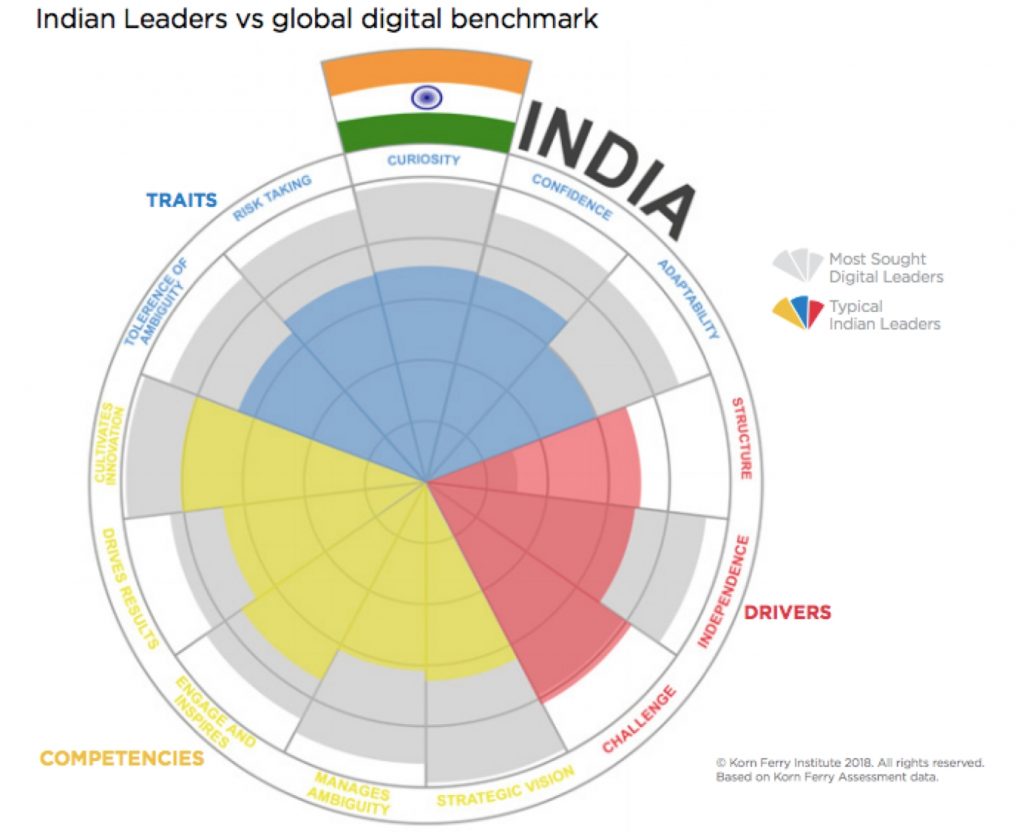Indian leaders struggle to adapt to change or move from their comfort zones, which limits their flexibility in the ambiguous digital environment.
The digital wave is influencing economies and businesses across the globe. In that, India’s market is a leading force globally and government investment in the Digital India initiative is significantly unleashing the power of digital connection. Despite the opportunities and efforts in the area, it seems business leaders in India have a lot to catch up with.
A recent Korn Ferry research indicates that leaders across the Asia Pacific are not yet digital-ready and risk derailing digital sustainability initiatives by perpetuating legacy ways of working. Within that, Indian leaders, in particular, see the market opportunities, yet many continue to struggle with what ‘digital’ looks like for their organisations, particularly as they continue to enjoy strong performance today.
The study compares a sample of over 2,600 Indian leaders to the digital leadership profile and suggests that Indian leaders need to embrace a radical shift in mindset to enable real and sustainable digital change within their organisations. “Great digital leaders do not only deliver results right now, but also create the conditions for future success,” the report states.
Indian leaders struggle to adapt to change, being more comfortable in certain conditions, which limits their capacity to be flexible in the ambiguous digital environment.
With a constantly increasing market demand, the war for the right talent is sure to get more intense, which makes it even more important for business leaders to embrace technology for a sustainable future. As per the report, while Indian leaders are strongly motivated by challenge and have the proven capacity to engage and inspire their people and deliver results, their preference for structure currently hinders their ability to engage and inspire their people in uncertain conditions and cultivate innovative thinking. As a result, it promotes the ‘safe’ approach—rather than giving free rein to more entrepreneurial thinking and iterative decision-making—and stifles curiosity, confidence and risk-taking.
In addition, as per the report, Indian leaders struggle to adapt to change, being more comfortable in certain conditions, which limits their capacity to be flexible in the ambiguous digital environment. Increasing their comfort level here will be essential for leading in the digital age. It will also help them develop a strong vision for the digital future of the enterprise and give them the confidence to make the risky decisions needed to get there.
Avdesh Mittal, senior client partner and managing director, Digital Practice, APAC Korn Ferry, believes digital transformation is about cultural change at an unprecedented scale. “It’s not just about recruiting a digital marketing manager or deploying an e-commerce channel and then saying, “I’ve done digital”. Change of this magnitude requires a shift in mindset and conviction from top leadership, which cascades through to the grassroots of the organisation. Yes, there is risk involved and this can challenge a leader’s conviction, but the world is not going to wait,” he opines.
Korn Ferry suggests three ways to kick-start the shift to a digital mindset.
Prioritising: Don’t do everything at once. Instead, take time to diagnose the critical leadership circuit breaker in your organisation. Create opportunities to clear this blockage first and build from there. This could involve finding ways to introduce aspects of a fail-fast culture to give leaders the opportunity to make mistakes without retribution and expand their confidence in riskier, less-certain environments.
Starting to recruit and develop the mindset: While working with existing leaders, start investing in the next generation. Develop a holistic talent strategy, supported by assessments and success profiles, to engage internal and external talent in the vision for the organisation and how they can contribute to it.
Creating and aligning symbols of change: Many challenges facing Indian leaders have their roots in cultural norms, which are difficult to shift. Actively creating symbols of change that align with the organisation’s goals will help address this. This might mean creating opportunities to open up hierarchies by using new channels of communication between leaders and employees through collaborative software and ensuring that strategic digital hires are positioned as change agents in the organisation, with the eyes and ears of the CEO.
Great digital leaders, as per Korn Ferry, are those who are flexible and inclusive, responding seamlessly to the push-and-pull priorities of the digital environment. One need not necessarily be only tech centric but more people centric. Combined with strong situational and emotional awareness, great leaders always step back and empower their people to test ideas; to succeed or fail and change direction as the conditions require. Critically, they create a supportive and focused environment for their people by engaging and inspiring them in a strong future vision and keeping a continued eye on driving for results.



